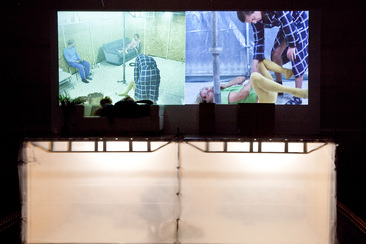 Markus Öhrn's Conte d'amour, photo by Robin Junicke Markus Öhrn's Conte d'amour, photo by Robin Junicke “We’ve been waiting for you, daddy.” –Anders Carlsson, Conte d’amour “Am I in love? –Yes, since I’m waiting.” –Roland Barthes, A Lover’s Discourse If you want love, pure love, get yourself a dummy. Sure, when you feed them chips or make them drink Coke, it will all just fall to the floor, but that’s precisely what you want. The absence of thirst and hunger means that they will never, ever leave you. In Markus Öhrn’s Conte d’amour, the other is a blank canvas onto which we can project our love, so that it can never find itself soiled by the other’s own velocity, since it has none. (I once wrote, “On veut la projection qui nous échappe par sa propre vie.”) Of course, a dummy might not fulfil all of your desires. So, alternatively, make sure that, if the one you love is human, they are as dependent on you as possible. It might be infantilizing, of course, but this works in your favour. Children are less likely to leave you than your adult partner. To make their leaving even less likely, bring them McDonald’s. Under the right light, those fries and nuggets can really look golden. “Everything is simpler in Thailand,” a character tells us. “Thai women are not as troublesome as Occidental ones.” This is the moment at which Conte d’amour becomes more than just a play loosely based on a sordid news story. This is the moment when in one fell swoop it becomes political by exposing the relationship between racism, sexism, and capitalism. The statement is of course naïve. What makes one less troublesome has nothing to do with race or gender. It has to do with one’s economic dependency. Eve was not made from Adam’s rib. She was made from his wallet. If you want love, pure love, do make the dependent one feel like they have some power. Withhold your attention so they feel like they have to earn it. Let them turn a basement beam into a stripper pole. If they can seduce you, they must have some power. Ignore the fact that their survival depends on it. The saviour comes down from the ceiling as though from a helicopter, bringing chips and Coke to his grateful African children. Maintain the system that keeps them dependent on you, but let them feel like you’re being good to them when you give them the bare necessities of life. The lover comes down from the skies, bearing gifts, to save us from the catastrophe zone that our single lives were, before they came along. To keep the other dependent on you, it might be best to make sure that they are satisfied with little. Like maracas. “Gifts… and the feelings that come with them.” The sequestered children even have a video camera. It gives them the illusion of agency, like they are not just objects, but subjects shaping their own reality. They are not just victims. They are witnesses of each other’s victimization. And yet, “I am a victim!” shouts that guy from Portlandia, who plays the only female character in the play (which probably should have ended on that powerful note). For the loved becomes owned by the lover, becomes the screen against which the projection (love) violently lands. During Conte d’amour, I kept thinking that it was like witnessing an extreme version of Roland Barthes’s A Lover’s Discourse. Except that, rereading my notes, I realized that I kept using “the lover” and “the loved” to refer to all of the characters, no matter if they were the kidnapper or the kidnapped. Maybe Barthes forgot that love can also be a form of Stockholm Syndrome. May 28-30 at 7pm Théâtre Rouge du Conservatoire www.fta.qc.ca 514.844.3822 / 1.866.984.3822 Tickets: 43$ / 30 years old and under: 38$
0 Comments
|
Sylvain Verstricht
has an MA in Film Studies and works in contemporary dance. His fiction has appeared in Headlight Anthology, Cactus Heart, and Birkensnake. s.verstricht [at] gmail [dot] com Categories
All
|
 RSS Feed
RSS Feed